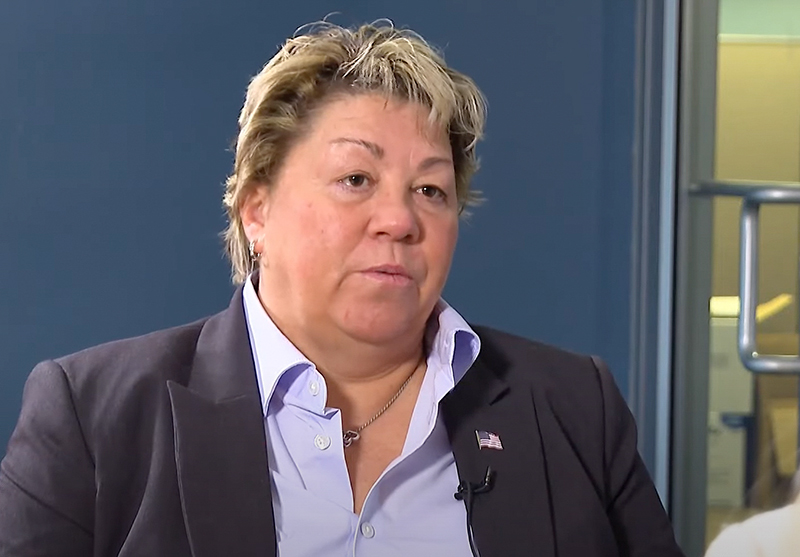Lawsuit Challenging Pro-Trans School Restroom Policy Dismissed
Federal judge says Bethel Local Schools' restroom policy is neutral and does not discriminate against students with anti-LGBTQ beliefs.

A federal judge has dismissed a lawsuit brought by a conservative legal organization on behalf of nine parents challenging an Ohio school district’s policy allowing transgender students to use multi-user bathrooms matching their gender identity.
U.S. District Judge Michael Newman, of the Southern District of Ohio, found that the claims made by the plaintiff lacked standing, and that the trans-affirming policy did not infringe on the religious rights of parents and their children who object to homosexuality or refuse to recognize transgender identity as valid.
The lawsuit, filed on behalf of the parents by American First Legal, an organization run by Stephen Miller, a former senior White House adviser to former President Donald Trump, argued that the Bethel Local Schools Board violated Ohio law by adopting a new trans-affirming policy “in secret,” alleging that members had discussed adopting the new policy in executive session, without seeking input or facilitating public discussion on the matter.
The lawsuit also argued that the new policy infringed on the students’ right to practice their religion and their parents’ right to determine how their children are raised and what messages they are exposed to by forcing the students to violate their anti-LGBTQ beliefs by sharing facilities with transgender students.
The new policy was adopted after a faculty member proposed, at a September school board meeting, to change the district’s current restroom policy for transgender students to allow them to use facilities matching their gender identity. The board president responded at the time that the board “was still conferring with [its] legal counsel in regards” to its legal responsibilities. In January the board ultimately, at counsel’s advice, changed its policy.
At around the same time, the parents of a transgender transfer student, referred to as “Anne” in the lawsuit, had asked if their daughter could use the girls’ communal restroom in addition to two single-user restrooms — one located in the nurse’s office and one reserved for faculty, located in between the middle school and high school offices — that she was permitted to use.
Anne had complained that using the single-stall restrooms was difficult because they were frequently occupied when she needed to use them, and she felt ostracized, humiliated, and targeted by other students who taunted her for using a separate bathroom. As a result, she’d hold her urine during the day to avoid using the restroom at school, which not only affected her health but negatively impacted her school performance due to her discomfort.
The school initially delayed making a decision on allowing Anne to access the girls’ restroom. The principal of Anne’s school and the superintendent later met with Anne’s parents to inform them their daughter would be allowed to use the girls’ restrooms when she returned from school break in January 2022.
Last year, after the end of the 2021-2022 school year, the conservative parents who objected to allowing transgender students to use communal restrooms that do not match their assigned sex at birth sued the district. But in his opinion issued on August 7, Newman sided with the school district, rejecting many of the arguments offered by America First Legal and its clients, noting that past case law has found parental rights are “limited in scope.”
“Indeed, this caselaw undermines the primary thrust of the Parents Plaintiffs’ argument. The School District’s decision — to allow Anne an accommodation to use the communal bathroom that aligns with her gender identity — does not in any way implicate the right to ‘send . . . children to a particular private school[,]’; the right of parents to direct the ‘care, custody, and control” of their children in the parental visitation context; the right to instruct children in certain subjects or homeschool them; or their control over where their children receive an education,” Newman wrote.
“In other words, the Parent Plaintiffs do not have a substantive due process right to dictate to the School District which bathroom a transgender student must use, anymore than the Parent Plaintiffs have the right to direct the ‘school curriculum’ as to their children completing assignments purportedly ‘promoting LGBTQ+ beliefs,'” he continued. “In each situation, the power to act is ‘committed to the control of state and local authorities.’ Accordingly, this claim merits dismissal on this basis.”
Newman also found the school’s restroom policy to be generally applicable and neutral, making “no reference, overt or implied, to religion or religious conduct” and treating all students equally by allowing them, regardless of circumstance, to use restrooms that correspond to their gender identity.
“Not every contentious debate, concerning matters of public importance, presents a cognizable federal lawsuit,” Newman concluded, explaining the rationale behind dismissing the lawsuit. “Although the parties, undoubtedly, seek to vindicate what they believe is the truth, the allegations in the complaint do not pass legal muster under the applicable methods of constitutional, statutory, or precedential interpretation.”
The American Civil Liberties Union of Ohio, which intervened in the case, representing Anne and her parents, praised the dismissal of the lawsuit.
“Today’s ruling reaffirms that the Constitution is not a vehicle to compel discrimination,” David Carey, the group’s deputy legal director, said in a statement. “Nothing in the constitutional guarantees of parenting rights, equal protection, or free exercise of religion mandates that transgender students be excluded from gender-appropriate communal restrooms on the basis of their classmates’ beliefs and values.
Carey added: “For public schools to function, one student’s or family’s religious beliefs cannot provide a basis to exclude another student from full participation in the school environment.”
Support Metro Weekly’s Journalism
These are challenging times for news organizations. And yet it’s crucial we stay active and provide vital resources and information to both our local readers and the world. So won’t you please take a moment and consider supporting Metro Weekly with a membership? For as little as $5 a month, you can help ensure Metro Weekly magazine and MetroWeekly.com remain free, viable resources as we provide the best, most diverse, culturally-resonant LGBTQ coverage in both the D.C. region and around the world. Memberships come with exclusive perks and discounts, your own personal digital delivery of each week’s magazine (and an archive), access to our Member's Lounge when it launches this fall, and exclusive members-only items like Metro Weekly Membership Mugs and Tote Bags! Check out all our membership levels here and please join us today!


























You must be logged in to post a comment.